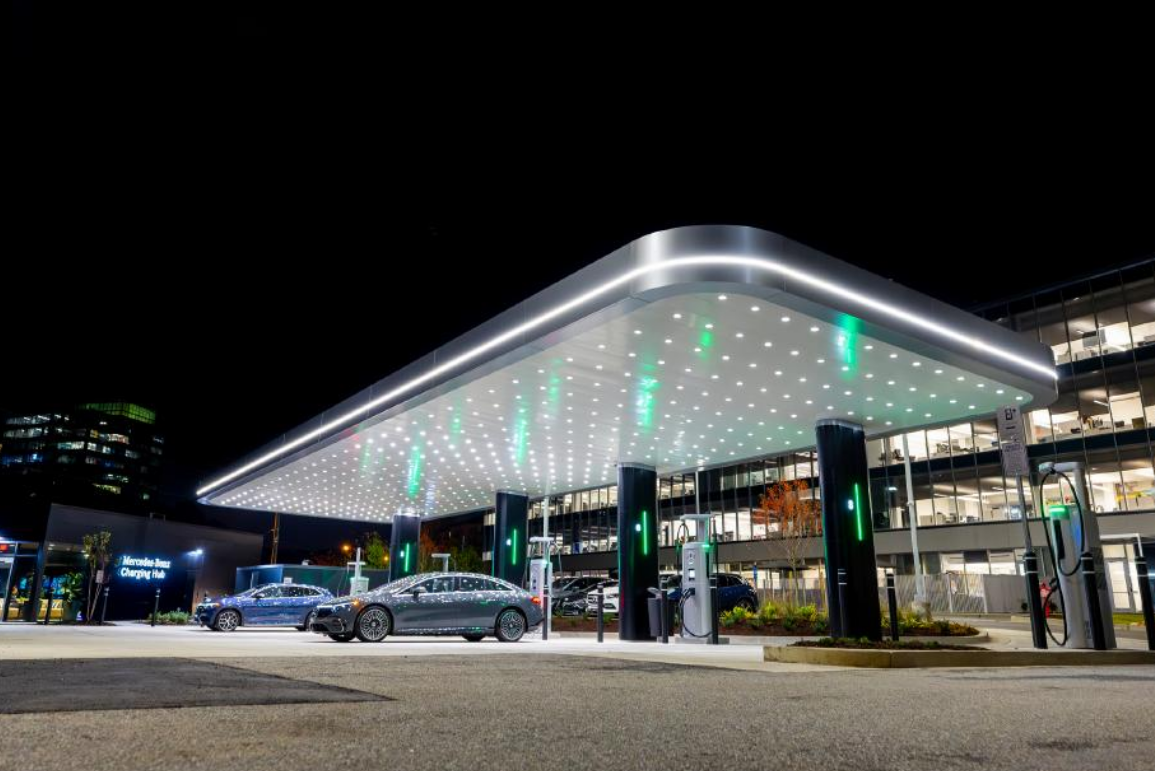
Tesla is currently celebrating the tenth anniversary of its Supercharger network in Europe, and local car manufacturers are now also starting to build their own charging infrastructure. Mercedes-Benz, Audi and Porsche want to retain their customers and attract new buyers with their own columns or even entire e-car lounges. Will the offensive come in time?
At the beginning of the year, Mercedes formulated particularly ambitious goals: 10,000 charging points are to be connected to the grid worldwide in the next few years. "We will equip the stations with 400 kW chargers – the fastest currently available. This will also make us fit for technical developments in the coming years," explains Eva Greiner, CTO of the Charging Unit at Mercedes-Benz Mobility.
She sees possible locations along long-distance transport routes as well as in urban centres. "Especially for users who don't have the opportunity to charge at home." For the USA, the Group has just signed contracts with a shopping mall operator for the installation of charging stations at around 55 locations, and the first charging stations have just gone into operation in China.
Porsche turns to 'Charging lounges
While Mercedes also allows cars from other brands to be connected to the cable, Porsche opens its "Charging Lounges" exclusively for drivers of its own models. Without a Porsche electric car, not even the barrier that provides access to the charging station and the adjoining lounge will be lifted.
Alexander Pollich, Porsche's head of Germany, did not want to commit himself to whether this will remain the case during the opening in Bingen, where the first system was installed near the A61/A60 motorway junction. "This is the first charging lounge and we want to learn in this dynamic environment first," says Pollich. In the course of the pilot project, further lounges are planned, each with four to six covered fast-charging stations and a small lounge area where the Porsche driver can freshen up and buy drinks and small snacks from the vending machine.

Audi also has its first own fast-charging locations, also with an attached lounge. Alexander Timmer, partner at the consulting firm Berylls, expects that this will not be the end of the story: "In Germany, the growth is in HPC fast charging. Manufacturers cannot escape this trend. In addition to these three manufacturers, we expect other carmakers to enter the market with their own networks." BMW, in particular, is considered a possible candidate for its own involvement.
The reason is clear to Timmer: "For the premium manufacturers, their own fast-charging stations are above all a shop window with an advertising effect. Such a system is likely to be profitable only in a few cases through the sale of electricity alone."
Mercedes charging manager Greiner has a similar view, deliberately opening the stations to drivers of third-party brands: "Of course, we want drivers of other brands to also come into contact with the Mercedes-Benz brand and experience that we also have something to offer in terms of infrastructure."
Ultra-fast charging is therefore also possible with a VW, as is the use of convenience services such as "Plug & Charge". However, only the company's own customers can access the full range of functions, such as a reservation function that ensures that the desired column is available on arrival.
For the company's own customers, the manufacturer's networks are popular points of contact. Above all, because they can rely on the general functioning, controllable costs and compatibility with their own vehicles.
Charging manufacturers not to get in the way of selling cars
However, manufacturers' charging offers are unlikely to become more widespread, at least in Germany. "In Germany, with its already well-developed HPC infrastructure, the premium manufacturers are more likely to operate a few lighthouse systems.
In areas with a weaker network – such as Eastern Europe – a stronger commitment is also conceivable," says Berylls expert Timmer. In general, he does not think that the Europeans will be able to catch up with Tesla with their networks. The Californians are far ahead, and are expected to operate around 100,000 charging points worldwide by 2028.
But that's probably not the plan at all: "I don't think the manufacturer's charging stations will last very long. It's more about a kind of development aid for e-mobility. It's about offering our own customers a reliable and pleasant charging experience at an early stage."
Full story at Car Manufacturers' Fast-Charging Networks: Development Assistance and Customer Care (sprit-plus.de)